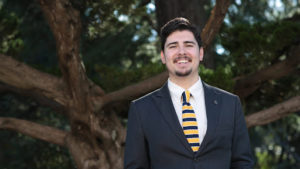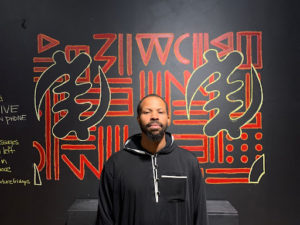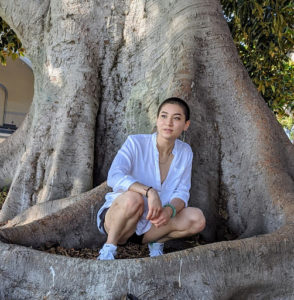
“The McNair Scholars Program was an integral part of my academic career. It was the first opportunity I had where I turned my lived experiences which had always been a drawback, a place of challenges and obstacles, into something productive, important, supportive, and restorative.” – Anthony Carrasco, B.A. Political Science, Legal Studies & Public Policy ‘18.
“The McNair Program gave me a personal introduction to research and the resources to be able to navigate the journey in higher education. I see myself as someone embedded with social movements. My goal is to teach at a university and apply research and whatever platform I have within the university to help house and improve the material conditions of people.” – Rasheed Shabazz, B.A. Political Science, African American Studies ’13; M.C.R.P. ’21
“So often, when we aren’t succeeding in the way that we expect to, we blame ourselves for it. And we don’t look externally at the systems that are keeping marginalized, first-generation, and low-income students from positions of power and higher academia, that make you feel like you’re not good enough. The McNair Scholars Program sets you up with a network that can help overcome these systemic barriers.” – Ilexis Chu-Jacoby, B.S. Molecular Environmental Biology ‘17.
McNair Scholar alumni Anthony Carrasco, Rasheed Shabazz, and Ilexis Chu-Jacoby are drawing from their lived experiences to become innovators and active agents of change in their graduate programs. They, along with sevenother UC Berkeley McNair Scholars, have entered Ph.D. programs at prestigious universities across the country this year due in large part to their participation in the Ronald E. McNair Postbaccalaureate Scholars Program (opens in a new tab).
Each year, the McNair Scholars Program at UC Berkeley provides up to 30 first-generation, low-income and/or otherwise underrepresented students the opportunity to pioneer their own research. Launched in 1987, to date well over 500 UC Berkeley students have benefitted from the program. Of the 187 universities in the U.S. that participate, UC Berkeley receives the largest amount of funding and supports the most students.
Selected undergraduate students are given a generous stipend, research training and resources, faculty mentoring, and staff support during a spring semester and subsequent summer to prepare them for doctoral studies with the goal of achieving doctoral degrees. Scholars also receive individualized assistance to complete a competitive graduate school application package, as well as financial support to cover application fees, which can present a substantial barrier for many students.
“It made 100% of the difference to have my application fees paid for or waived through the McNair Scholars Program. I don’t know if I would have applied this year if that hadn’t been the case,” said Ilexis Chu-Jacoby.
“As an undergraduate, finding mentorship from faculty is very difficult,” noted Anthony Carrasco. “Without McNair, I don’t think I would have received significant attention from a faculty member. The program instilled valuable lessons in developing relationships with faculty.”
Encouraging a diversity of voices and experiences
Scholars are encouraged to draw from their own life experiences as a basis for their McNair research project, which they then can share at the National Ronald E. McNair Scholars Symposium at UC Berkeley and in The Berkeley McNair Research Journal.
Said Jessica Perez (B.A. Psychology ‘18), “Without a doubt, being a McNair scholar propelled me to where I am today — a first-generation, Latinx, former foster youth, doctoral student on a full-tuition fellowship. I am extremely grateful to be published (a dream I never thought I’d accomplish), present findings at a national symposium showcasing my skills for advocacy of a marginalized community, and having those findings used in grant writing to address food insecurity amongst that community.”
The McNair Program at Berkeley is an essential part of the university’s drive to expand and support diversity not only within the Berkeley student community but also in graduate education across the country. “As higher education gets more expensive and more difficult, programs like McNair only become more vital in ensuring education doesn’t become just for privileged elite,” explained one McNair advisor in a program video (opens in a new tab).
Diversity is the hallmark of McNair Program scholars. “I was a part of a cohort comprised of African American students and students from Africa, documented and undocumented students, students from across spectrum as far as age, gender and sexuality, interested in very diverse topics, from the origins of the farmworkers’ movement to studying the human genome,” said Anthony Carrasco.
From homelessness to homeless advocate: Anthony Carrasco

This fall, Anthony Carrasco will be starting a joint Ph.D. and J.D. program in Jurisprudence and Social Policy at Berkeley Law, where he’ll be working on synthesizing research and policy to address homelessness.
Anthony’s journey began as a child of hard-working parents who struggled to overcome the obstacles of homelessness during a significant part of his childhood in Southern California. It was only when the family was able to move to Northern California during his high school years that he finally experienced housing security and a sense of stability. “All these experiences, when I came to Berkeley, were very motivating as far as subjects that I wanted to work to address,” he said.
The McNair Program gave Anthony the exposure to research he lacked. “Only a handful of people in my family had ever graduated from high school, so I had no real experience with higher education,” he explained. “During my McNair project, in the summer of 2017, I was able to explore experiences similar to my own, piloting research to understand experiences of homeless children in Orange County, California school districts.” Anthony’s McNair project (opens in a new tab) attempted to bridge critical race theories in education and the lived experiences of homeless youth.
From there, Anthony became a vocal advocate for economic justice. As a member of the City of Berkeley’s Youth Commission, he advised the mayor on policy impacts and helped establish the city’s first homeless youth policy in 2018. He graduated in 2018 with Highest Honors from Berkeley with a double major in Political Science and Legal Studies and his honors thesis won the 2020 Law and Society Association Undergraduate Student Paper Prize for outstanding research. In 2019, he was awarded a prestigious John W. Gardner Fellowship (opens in a new tab), working with Compass Family Services as a legislative advocate for homeless family services.
In his doctoral studies, Anthony plans to research homelessness from a political and socio-legal point of view, exploring whether the U.S. Constitution provides a right to housing.
From displaced to disrupting racial barriers in housing policy: Rasheed Shabazz

“I’m interested in housing, housing policy, and housing community organizing, as well as the laws and the policies that have created structures of racial segregation and inequality,” explained Rasheed Shabazz. “I’m interested in the different ways people have resisted, fought to break down those structures, as well as create alternatives to the prevailing order.”
Like Anthony, Rasheed’s academic passion is a natural outgrowth of his personal experience.
In 2004, Rasheed and his family were displaced, along with 400 other mostly low-income families when owners of the Harbor Island Apartments in West Alameda began an abrupt and heartless eviction of the residents. “My undergraduate thesis (opens in a new tab) on African Americans in Alameda and our experiences with housing ultimately is what led me on this path toward urban planning and understanding issues related to housing,” he explained.
For his McNair research project in 2013, Rasheed focused on the significance of Merritt College to the Black Studies, Black Campus, and Black Power Movements of the 1960s, and the impact that race, class, and changing demographics had in its relocation from the flatlands of North Oakland to the Oakland Hills in the early 1970s. He presented his research (opens in a new tab) at the McNair National Symposium at Berkeley and in Atlanta and Cincinnati, and his research article, “Mau Mau Tech”: The Making of a Black University in Oakland, California, 1960-1970, was published in the McNair Journal.
Rasheed earned a double major in African American Studies and Political Science, with a minor in Urban Planning in 2013, and a master’s in City & Regional Planning from the College of Environmental Design this past spring. After applying to nine doctoral programs and three acceptances, he’ll begin working on an Urban Planning Ph.D. at UCLA this fall.
“McNair was an empowering experience. It has had so many benefits I’ve been able to use on this journey towards grad school,” he said. “I do not know if I would have considered graduate school otherwise, nor how I would have been able to get into the master’s and this Ph.D. program at top universities.”
Nurturing seeds of discovery in medicinal plant science: Ilexis Chu-Jacoby

The support of the entire McNair community — staff, faculty, grad students, and cohort scholars — is one of the strongest assets that ensures success for students. “Having institutions and a community that believe in you goes a really long way,” said Ilexis Chu-Jacoby.
Of the 27 McNair scholars comprising Ilexis’s 2017 cohort, six were pursuing science degrees. But it wasn’t just her fellow McNair science scholars who helped her hone her research.
“Having a diversity of opinions definitely benefited my research,” Ilexis explained. “A lot of the cohort weren’t in science, so explaining my research to them was useful and grounding. It challenged my understanding of the material to explain it from a non-scientific background.”
For her McNair research project, Ilexis investigated carbon mineral associations in soil, adding to the body of knowledge that will help optimize carbon sequestration in soils and combat climate change.
As a multiracial first-generation student, Ilexis is passionate about integrating social ramifications into her scientific lens and methods of research. An illness in her family opened her eyes to the benefits of traditional plant remedies, inspiring a desire to study medicinal plants. “Since I had been in the soil microbial ecology lab, I have a certain amount of expertise I can bring to what affects medicinal plants from a socio-ecological perspective,” she explained.
Ilexis begins her doctoral studies in the horticulture section of the School of Integrative Plant Sciences at Cornell this fall. There, she hopes to do ethnobotanical surveys and explore the cultural and soil ecology influences on medicinal plant cultivation in upstate New York.
The strength that comes from community
Without question, participation in the UC Berkeley McNair Scholars Program is a life-altering experience, forging enduring relationships.
“The McNair Scholars program completely changed my life,” said Meghan Nolan (B.S. Molecular Environmental Biology ‘20). “I gained valuable skills and experiences to help prepare me for graduate school. What I didn’t expect were the ways that I grew through the bonds that I formed with my cohort and the support of the McNair staff. We worked hard and supported each other throughout the entire graduate school application process.”
Alagia Cirolia (B.A. Cognitive Science ‘17) noted, “Our seminars helped me own my narrative, get feedback from peers who had my best interests at heart, and find my own confidence in seeing friends walk many different paths to success.”
Continuing to forge ahead
Along with Anthony, Rasheed, and Ilexis, the eight other scholars from UC Berkeley’s McNair Program who have been admitted to Ph.D. programs this fall include:
Ailin Chen, B.S. Mechanical Engineering ‘21
Graduate program: UC Berkeley Ph.D. Mechanical Engineering. Field of study: Materials, bioinspired design, and additive manufacturing
Alagia Cirolia, B.A. Cognitive Science ‘17
Graduate program: UC Berkeley M.S.W./Ph.D. combined program in the Department of Social Welfare. Field of study: Social Welfare focusing in Children & Family service engagement
Genesis Mazariegos, B.A. Anthropology ‘19
Graduate Program: UC Irvine Ph.D. Field of Study: Global and International Studies
Meghan Nolan, B.S. Molecular Environmental Biology ‘20
Graduate Program: Stanford University Ph.D. Field of Study: Molecular Biology/Microbiology
Michael Papias, B.A. Ethnic Studies ‘21
Declined Ph.D. program offers from NYU and the University of Wisconsin, Madison in Sociology, and an NSF award to continue working on the outcome of his McNair research: Tú eres Tú/You are You: A Zine Building Course for Latina/x/o Foster Youth (opens in a new tab)
Jessica Perez, B.A. Psychology ‘18
Graduate program: University of Indianapolis Psy.D. Field of Study: Adult Psychopathology, Family & Marriage Counseling, Trauma, Ethnic Psychology
Ashley Quiterio, B.S. Data Science ‘21
Graduate Program: Northwestern University Ph.D. Field of Study: Learning Sciences
Savannah Sturla, B.S. Environmental Sciences ‘21
Graduate program: University of Michigan School of Public Health, Environmental Health Sciences Ph.D. Field of Study: Environmental Health Sciences
Preparing the next wave of academic leaders
This year’s group of 30 UC Berkeley McNair Scholars worked tirelessly for the past eight months, spending a significant amount of time designing and implementing their research projects, analyzing their results, and developing their research presentations.
Said Juan Francisco Esteva Martínez, Ronald E. McNair Postbaccalaureate Scholars Program Director, “I am inspired by all scholars for their perseverance and hard work, and I congratulate them on achieving the goal of completing an independent research project. UC Berkeley McNair Scholars represent the future of academia not only for providing alternative perspectives to already well-established ideas but also because they will quite literally be the future researchers and faculty members in colleges and universities across the United States.”
First-generation and low-income undergraduate students and those from underrepresented backgrounds are highly encouraged to apply (opens in a new tab) to the McNair Scholars Program (opens in a new tab). This year’s application deadline is Tuesday, October 1, 2021.
Information workshops (opens in a new tab) are being held via Zoom through the month of September.